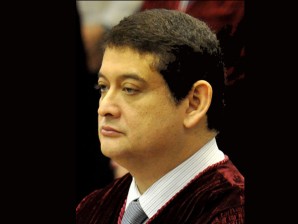MANILA, Philippines—The Philippines is in danger of being lumped with countries that are known havens for dirty money after the Senate failed to pass a bill proposing to increase the number of predicate crimes covered by the Anti-Money Laundering Act (Amla), the bill’s sponsor, Senator Teofisto Guingona III, has warned.
The committee report on Senate Bill 3123, cosponsored by Guingona and Sen. Sergio Osmeña, remained in the interpellation stage on Wednesday, the last session day before Congress went on another two-week recess.
Nine senators have served notice that they intend to question Osmeña and Guingona concerning the amendments they are proposing to Republic Act 9160, or Amla.
Being included in the blacklist would mean restrictive regulations in international transactions involving the Philippines, including those of overseas Filipino workers and Philippine businesses.
“In two days, the Financial Action Task Force (FATF) will decide whether or not our efforts against the global fight against corruption and criminal money are enough,” Guingona said on the Senate floor on Wednesday night when it became apparent the bill wouldn’t pass.
“In two days we might fall into the blacklist, formally referred to as the list of Non-Cooperative Countries or Territories,” he said.
Senate President Juan Ponce Enrile downplayed the prospect of severe sanctions from the FATF, the Paris-based intergovernmental watchdog body against money laundering.
“Those are just threats,” he said, while also questioning the authority of the FATF to impose sanctions.
“Who gave them the idea that they can dictate on governments who invested them with that power?” he said.
“This is a part of a convention. This task force was organized by not all the members of the convention but only a few,” he said.
Enrile explained that some senators had reservations about the third amendment being proposed, which would increase the number of predicate crimes that should be covered by Amla. A predicate offense is a public crime that, as a matter of logic or statutory provision, is or must be a part of an offense.
“I respect the right of everyone to make a decision,” he told reporters.
Among those who reserved the right to ask questions were Senators Joker Arroyo, Panfilo Lacson, Loren Legarda, Jinggoy Estrada, Miriam Defensor-Santiago, Ferdinand Marcos, Jr., Ralph Recto, Manuel Villar and Alan Peter Cayetano.
The FATF is meeting on Friday to decide whether the Philippines would remain in its grey list or fall into its black list.
The Philippines earned an upgrade a few months ago, moving up to the grey list from the dark grey list after Congress passed two of the three laws demanded by the FATF.
Guingona asked the senators to recognize the weaknesses of the country’s anti-money laundering law and exert serious effort to improve it.
He noted that 155 days have passed since the bill was sponsored and has been on the plenary’s agenda for already 20 days, “but it sadly still remains on the floor today.”
“We owe it to every citizen, who wants to see this government effectively win in the fight against corruption and dirty money. We cannot be remiss in that duty,” Guingona said.
